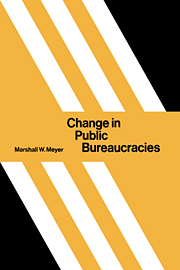2 - Organizational research
Published online by Cambridge University Press: 05 November 2011
Summary
We now turn to the design of research studies whose results are reported in this book. The design of research, of course, depends very much on the ideas or hypotheses to be explored, but it also has consequences. In particular, the possibilities for unanticipated findings are very much influenced by design considerations; and it is in this sense that method governs the substance of research. Our account of the studies of finance agencies begins with a formal introduction to comparative organizational research and the differences between panel or longitudinal as opposed to more conventional cross-sectional designs. This discussion is methodological for it concerns techniques rather than ideas. We then turn to the design of the research on finance agencies and some consequences of the longitudinal design that had not been expected but that changed fundamentally the substance of the research. Why this shift occurred will be explored in some detail.
The longitudinal approach to organizations
The longitudinal approach to the study of organizations is a natural outgrowth of developments in the field over the past two decades. The early sociological studies of large Organizational scale organizations, done mainly by students of Robert K. Merton just after World War II, were case analyses. (See especially Selznick, 1949; Lipset, 1950; Blau, 1955; and Gouldner, 1954.) These works had the virtues of depth and fidelity–no one could deny that they were accurate portraits of the organizations studied–but the scientific value of observations based on single cases is subject to question.
- Type
- Chapter
- Information
- Change in Public Bureaucracies , pp. 42 - 71Publisher: Cambridge University PressPrint publication year: 1979



